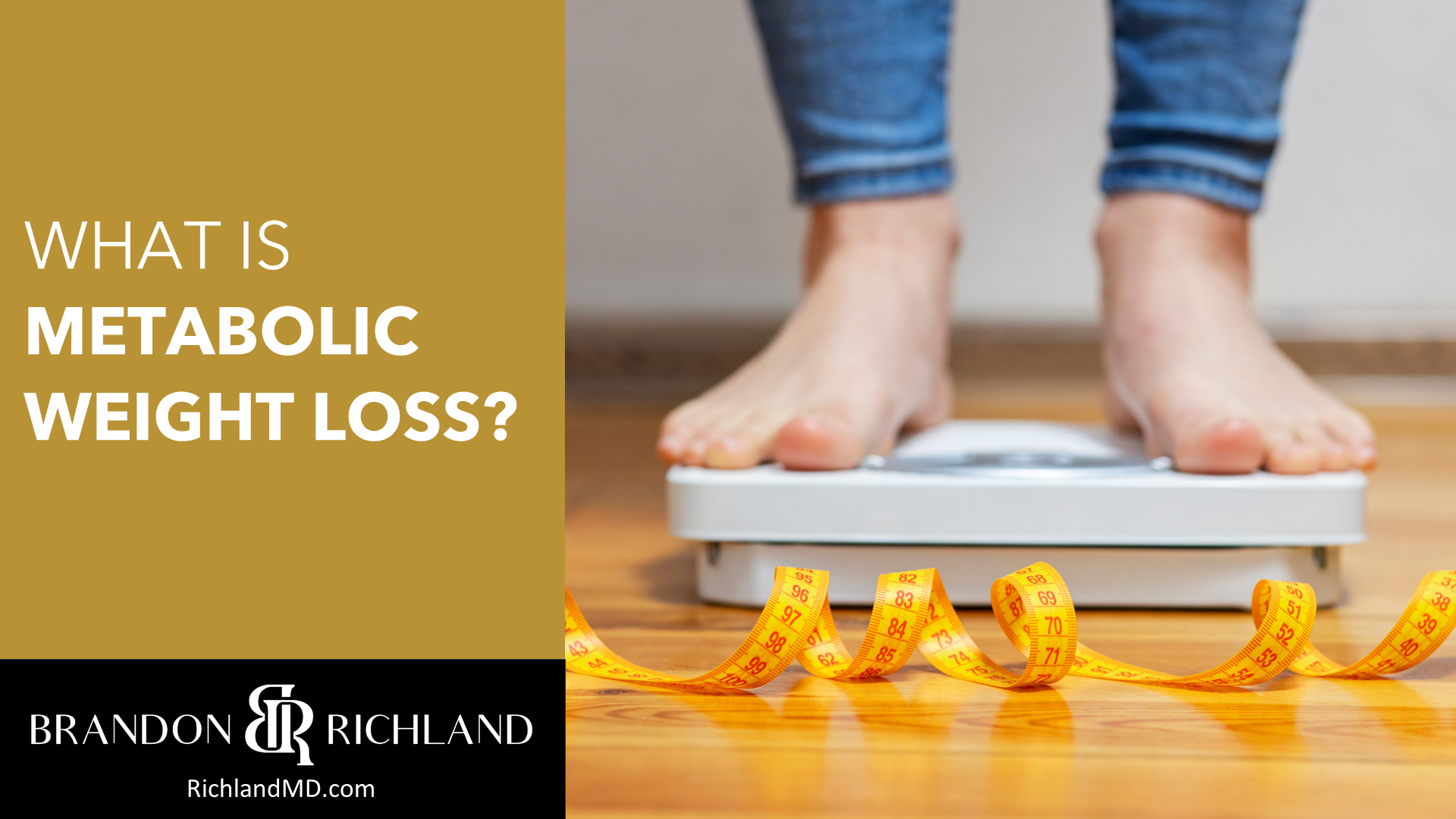Published by Dr. Brandon Richland, MD

Metabolic weight loss is rooted in understanding how the body converts food into energy, a process known as metabolism. Everyone’s metabolism operates at a different pace, influenced by factors such as genetics, age, sex, and body composition. For individuals looking to lose weight, a key consideration is creating a balance between calorie intake and the body’s calorie-burning rate. Adjusting dietary and exercise habits can impact one’s metabolic rate, potentially leading to more effective weight management.
Implementing dietary approaches to boost metabolism often involves choosing foods that require more energy to digest, absorb, and metabolize than others. Exercise and physical activity are also critical, as they not only increase calorie expenditure but can also build muscle mass, which in turn can raise the resting metabolic rate. Beyond diet and exercise, lifestyle factors like sleep quality and stress levels can influence metabolism.
Key Takeaways of Metabolic Weight Loss
- Metabolic weight loss focuses on balancing calorie consumption with the body’s energy expenditure.
- Diet and exercise are central to enhancing metabolic rate and supporting weight loss efforts.
- Sustainable lifestyle changes are more effective than quick fixes for long-term weight management.
Understanding Metabolism and Weight Loss
In the journey of weight loss, understanding one’s metabolism is like having a roadmap. It’s critical to know how the metabolic rate affects the body’s ability to shed pounds, the part age and hormones play in this complex process, and the influence of factors like thyroid function and genes.
Metabolism refers to all the chemical reactions that take place in the body to sustain life. These reactions help with everything from breathing to digesting food. Central to this is the basal metabolic rate (BMR), which is the number of calories your body needs to perform basic life-sustaining functions. Generally, a higher BMR means that one tends to burn more calories at rest, aiding in weight loss.
Influence of Age on Metabolism
As individuals age, their metabolism naturally slows down, which can contribute to changes in body weight. This is partly because muscle mass tends to decrease with age, and muscle tissue burns more calories than fat tissue does, even at rest. It’s important to adjust caloric intake and physical activity to match the body’s changing metabolic needs.
Interplay Between Metabolism and Hormones
Hormones play a significant role in governing metabolic rate. The thyroid gland produces hormones that regulate metabolism. If the thyroid is underactive, a condition known as hypothyroidism, the metabolic rate can decrease, leading to weight gain. Conversely, an overactive thyroid can lead to weight loss. Hormonal balance is essential for maintaining an optimal BMR and managing body weight.
Dietary Approaches to Boost Metabolism
When aiming for metabolic weight loss, the composition of one’s diet and the timing of food intake are key factors. Adjusting these can lead to changes in metabolism and overall energy expenditure.

Calorie Restriction and Metabolic Adaptation
Calorie restriction involves reducing the average daily caloric intake without malnutrition. While it often results in initial weight loss, metabolic adaptation can occur whereby the body adjusts to the lower calorie intake by decreasing energy expenditure. This adaptation can slow down weight loss over time. To combat this, incorporating healthy eating habits like choosing high-fiber foods can maintain a feeling of fullness and potentially minimize the metabolic slowdown.
The Impact of Macronutrients on Metabolism
The composition of macronutrients, protein, carbohydrates, and fats; in one’s diet can significantly affect metabolism. Diets rich in protein may enhance the thermic effect of food, the calories burned during digestion. Furthermore, healthy fats found in foods like avocados and nuts can support metabolism without the negative impacts associated with intake of processed foods. It’s also advisable to not skip breakfast, as it can help maintain a steady metabolism throughout the day.
Role of Intermittent Fasting
Intermittent fasting (IF) alternates periods of eating with periods of fasting and can lead to changes in body composition through several metabolic pathways. IF has been linked to improvements in energy expenditure and increased fat oxidation, which can contribute to weight loss. Importantly, during feeding periods, maintaining a balance of macronutrients and prioritizing low-calorie intake from nutritious foods will support metabolic improvements from IF.
Exercise and Physical Activity
Regular exercise and physical activity are crucial for metabolic weight loss. They enhance calorie burning and are essential for maintaining lean muscle mass, which is key for a healthy metabolism.
Varieties of Metabolic Exercise
Metabolic exercises are those that increase the metabolism for a period of time post-exercise, leading to increased calorie burn even at rest. Strength training and cardiovascular activities fall into this category. Strength training, particularly, not only burns calories during the activity but also helps build muscle mass. Muscle tissue burns more calories than fat tissue, thus contributing to a higher resting metabolic rate.
- Strength Training: Lifting weights or using resistance bands.
- Cardio Activities: Jogging, cycling, or swimming.
Importance of Muscle Mass
Muscle mass plays a pivotal role in metabolic weight loss. It’s more metabolically active than fat, which means it burns more calories even when not exercising. Incorporating strength training into an exercise routine is essential because it helps to preserve and increase muscle mass, which is beneficial for long-term weight management.
- Preservation: Muscle mass naturally declines with age, but regular activity and strength training can help prevent this loss.
- Enhancement: Building muscle increases resting energy expenditure.
High-Intensity Interval Training (HIIT) Effects
High-Intensity Interval Training (HIIT) is a form of exercise that alternates short bursts of intense activity with periods of rest or lower-intensity exercise. HIIT has been shown to burn a significant amount of calories in a short period and can enhance metabolic rates for hours after the workout.
- Calorie Burning: HIIT can burn more calories in a shorter time compared to steady-state cardio.
- Metabolic Boost: The high intensity of HIIT increases the resting metabolic rate post-exercise.
Incorporating a variety of exercises, including HIIT and strength training, can lead to significant enhancements in metabolic function and aid in weight loss. Regular physical activity and the maintenance of muscle mass are potent contributors to a healthy and sustainable metabolism.
Lifestyle Considerations
In addressing metabolic weight loss, it’s essential to focus not only on diet and exercise but also on lifestyle factors that play a significant role. Optimizing sleep, managing stress, and ensuring adequate hydration are keys to supporting the body’s metabolic functions.
Impact of Sleep on Metabolism
Adequate sleep is foundational for a well-functioning metabolism. Studies have shown that individuals who get less than the recommended 7-9 hours of sleep may experience slower metabolism and increased appetite. This can lead to weight gain, as the body craves more high-calorie foods for energy.
Stress and Metabolic Functioning
Stress can greatly affect one’s metabolic health. When under stress, the body releases cortisol, a hormone that can prompt fat storage, particularly around the midsection. This stress response can also make sticking to healthy lifestyle choices more challenging.
Influence of Hydration and Nutrient Absorption
Proper hydration is crucial for metabolic processes. Water is necessary for the digestion and absorption of nutrients and helps to boost metabolic rate. In fact, drinking water has been linked to a temporary increase in metabolism, while dehydration can lead to decreased metabolic functioning.
Nutritional Aspects of Weight Management
In managing weight effectively, it’s crucial to understand the impact of dietary choices on the body’s metabolism. The quality and quantity of consumed macronutrients, along with dietary fiber, play a pivotal role in energy balance and weight control.
The Significance of Macronutrients and Fiber
Macronutrients, which include carbohydrates, proteins, and fats, are the primary sources of energy for the body. Consuming the right balance of these nutrients is central to metabolic weight loss. Carbohydrates are the body’s preferred source of glucose, which fuels bodily functions and physical activity. Complex carbohydrates, particularly those high in fiber such as fruits and whole grains, should be chosen over simple sugars for sustained energy and satiety.
- Proteins: Essential for muscle repair and growth. They also increase satiety and can aid in maintaining lean muscle mass during weight loss.
- Fats: Necessary for absorbing fat-soluble vitamins and providing long-lasting energy. Not all fats are created equal, and a focus on healthy acids, such as omega-3 and omega-6, is important.
- Fiber: Helps regulate blood sugar levels and supports digestive health. It’s found in abundance in fruits, vegetables, and whole grains.
Choosing the Right Fats and Sugars
Selecting the right types of fats and avoiding excessive sugars are both critical strategies in nutritional weight management. Monounsaturated and polyunsaturated fats, found in foods like avocados, oily fish, and nuts, contribute to a healthy lipid profile and can be anti-inflammatory. Conversely, trans fats and certain saturated fats may negatively impact health and should be limited.
- Healthy Fats: Include items like:
- Avocados
- Nuts
- Seeds
- Olive oil
- Sugars: Excessive consumption of sugar, especially added sugars found in many processed foods, can lead to an energy surplus resulting in weight gain. Natural sugars found in fruits are generally considered part of a healthy diet, especially when consumed in whole form.
The keto diet is an example of a high-fat, low-carbohydrate approach which aims to shift the body into nutritional ketosis, a state where fat is utilized for energy instead of glucose. This method has shown efficacy in weight management for some, though individual responses to dietary patterns can vary.
Frequently Asked Questions About Metabolic Weight Loss
1. What Are The Key Components of a Metabolic Weight Loss Diet Plan?
A metabolic weight loss diet plan typically involves a combination of macronutrient balance and reduced calorie intake to stimulate metabolism. It often includes high-protein, fiber-rich foods and complex carbohydrates.
2. How Can Certain Foods Increase Metabolism and Assist in Fat Burning?
Foods such as lean proteins, whole grains, and chili peppers can increase one’s metabolic rate due to their thermogenic properties, leading to more calories being burned.
3. What to Consider When Looking at Reviews for Metabolic Weight Loss Programs?
When reviewing metabolic weight loss programs, one should consider the program’s evidence-based approach and its ability to cater to individual hormonal cycles and lifestyles.
4. How Does Metabolic Weight Loss Surgery Work, and Who Is It Suitable For?
Metabolic weight loss surgery works by altering the digestive system to facilitate weight loss, suitable for individuals with obesity when other weight loss methods have not been effective. Procedures may include gastric bypass or sleeve gastrectomy.
5. What Are Some Popular Supplements Used in Metabolic Weight Loss, and Are They Effective?
Popular supplements such as green tea extract and conjugated linoleic acid purport to support metabolic weight loss by increasing fat oxidation. However, their effectiveness may vary from person to person, and they should be used in conjunction with diet and exercise.

Conclusion and Summary of What is Metabolic Weight Loss?
Metabolic weight loss represents a comprehensive approach that extends beyond simple calorie counting, focusing on enhancing the body’s metabolism to improve weight management. It underscores the importance of understanding the various factors that influence metabolism, such as age, hormones, body composition, and lifestyle choices, and how they interact to affect weight loss and maintenance.
This approach encourages a balanced diet rich in nutrients that boost metabolic rate, regular physical activity to increase calorie burn and muscle mass, and attention to lifestyle factors like sleep quality and stress management.
Metabolic weight loss offers a science-based, holistic approach to weight management that prioritizes long-term health and sustainability over temporary solutions. By focusing on the underlying factors that influence metabolism, individuals can achieve more meaningful and lasting results in their weight loss journeys. It is not just about losing weight but about making lifelong changes to improve overall metabolic health, which can lead to a higher quality of life.
Please note that this article is intended for informational purposes only and should not be construed as medical advice. Before making any changes to your treatments, please consult with your healthcare provider to discuss the appropriateness and safety of such changes.
Ready For Your First-Class Cosmetic Experience in Orange County (OC) California (CA)?
Are you located in one of these Orange County (OC) / Southern California cities?
Aliso Viejo, Anaheim, Brea, Buena Park, Costa Mesa, Coto de Caza, Cypress, Dana Point, Fountain Valley, Fullerton, Garden Grove, Huntington Beach, Irvine, La Habra, La Palma, Laguna Beach, Laguna Hills, Laguna Niguel, Laguna Woods, Ladera Ranch, Lake Forest, Los Alamitos, Mission Viejo, Newport Beach, Orange, Placentia, Rancho Santa Margarita, San Clemente, San Juan Capistrano, Santa Ana, Seal Beach, Stanton, Tustin, Villa Park, Westminster, or Yorba Linda?
Plastic Surgeon Dr. Brandon Richland, MD and our Cosmetic Aesthetics Team are ready to help you look and feel your absolute best.
Elevate your confidence and self esteem levels to unfathomable new heights!
Schedule your in-person consultation in our modern and luxurious offices in either Fountain Valley, CA (Main HQ) or our Newport Beach, CA office.
Do you live outside of Southern California or short on time? For your convenience, Virtual Consultations are also available.
Our warm and engaging Team of carefully selected Aesthetics Professionals will make you feel calm, cool, collected, and right at home throughout your entire consultation and surgery process.
Schedule Your Aesthetics Consultation here, or call us directly at 714-241-0646 or 949-945-0025 today.
About the Author

Dr. Brandon Richland, MD is a respected Board Certified Licensed Plastic Surgeon in Orange County / Southern California specializing in cosmetic and reconstructive surgeries.
Driven by his passion for medicine, Dr. Richland obtained his Doctor of Medicine (M.D.) degree from the prestigious program at Saint Louis University (SLU) School of Medicine in 2013. His exceptional skills were recognized when he received the McGraw Hill / Lange Medical Student Academic Achievement Award, and graduated top of his class with Honors. For his undergraduate degree, he attended University of California, Los Angeles (UCLA) and graduated with Honors in 2009.
To further enhance his surgical expertise, Dr. Richland completed his Residency in Plastic Surgery at the University of California, Irvine (UCI) from 2013 to 2019 earning the Academic Achievement Award twice during this period. A total of 14 years in dedicated schooling and medical residency.
Dr. Richland is actively involved with healthcare and medical societies, as a Diplomate of the American Board of Plastic Surgery, a member of the American Society of Plastic Surgeons, American Society of Aesthetic Plastic Surgeons, and the California Society of Plastic Surgeons.
Contact Dr. Richland today by visiting RichlandMD.com, scheduling a cosmetic consultation, or by calling 714-241-0646 or 949-945-0025 directly.










